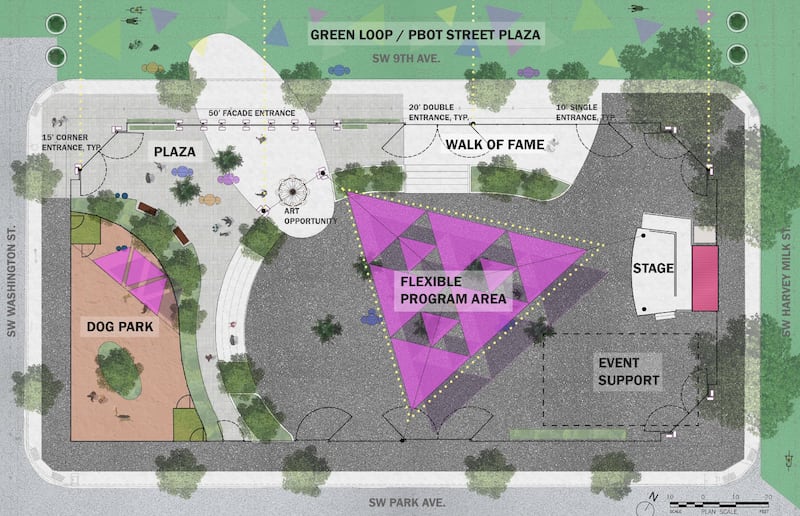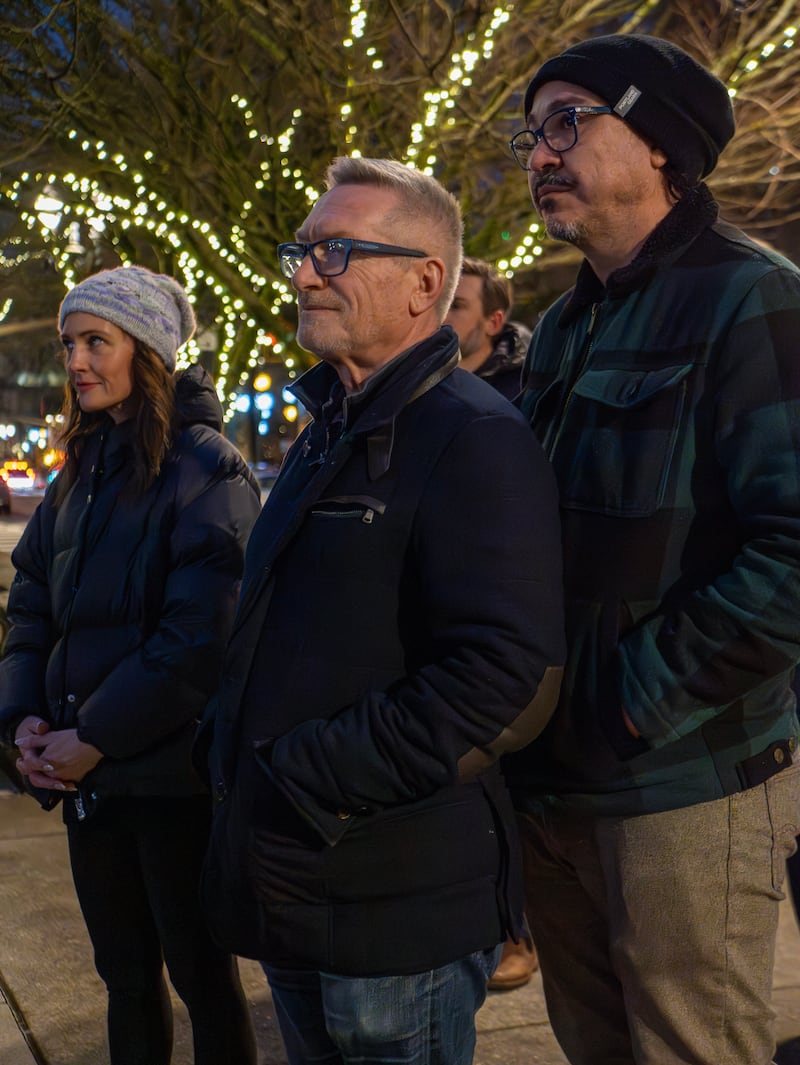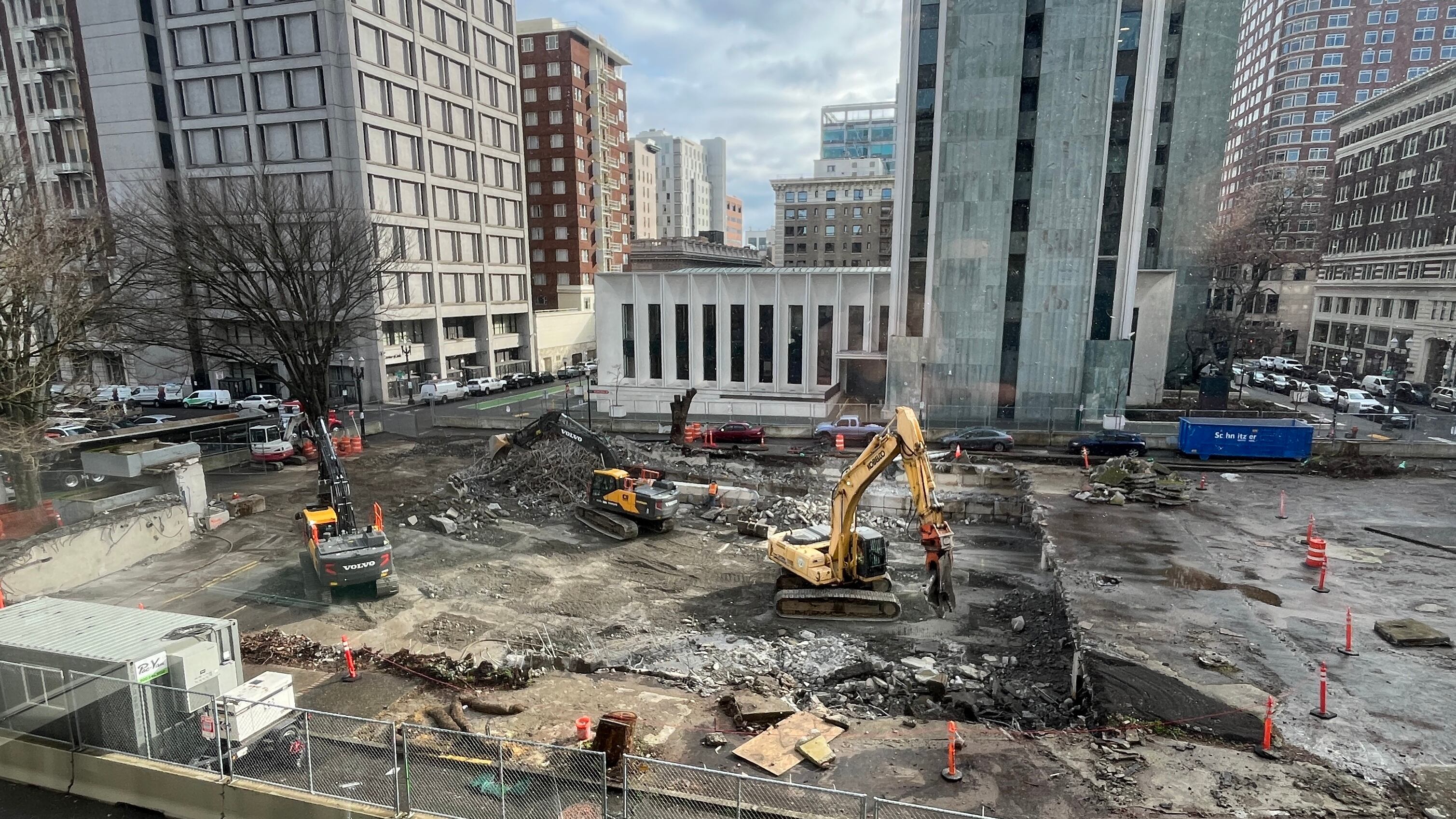Tim Eddy has enjoyed a bird’s-eye view of Darcelle XV Plaza for 30 years.
“I’ve seen everything,” he says.
His firm, Hennebery Eddy Architects, has offices on the second floor of the Pittock Block, just west of the plaza. Over the years, he’s seen the good (people enjoying lunch in the summer sun), the bad (smokestack-worthy drug exhalations), and the ugly (Portland Bureau of Transportation contractors ripping out mature trees to remodel the plaza).
Last Thursday, he watched an excavator with a mechanical claw tear apart the concrete slab at the plaza like a tyrannosaur ripping up prey. The slab covered an ill-conceived parking garage at the site—an element that is going away under the latest plan to fix Darcelle XV Plaza, previously known as O’Bryant Square and (informally, because of drugs) Needle Park and Paranoid Park.
It’s not a stretch to say the plaza was one of the most blighted pieces of property in Portland before the excavators arrived. And no bit of Stumptown squalor has such high-end neighbors.
The Benson Hotel is just around the corner. The brand-new, 30-story Park Avenue West building is two blocks south. Just off the southwest corner stands the $600 million Block 216 building, which has top-shelf office space, Ritz-Carlton Residence condominiums listed for $2.8 million (down from $3.1 million), and a Ritz-Carlton hotel with rooms for $420 a night.
In July, Brian Owendoff, a representative for Block 216′s brash developer, Walt Bowen, wrote a letter telling City Commissioner Dan Ryan what he wanted to see at Darcelle XV Plaza. Ryan is the commissioner in charge of Portland Parks & Recreation, and he has the final say on the matter.
Owendoff said he was writing as “a Portland resident that has been actively engaged in the development of over $1.5 billion of commercial real estate in downtown Portland,” but disclosed that he was the “representative on all aspects” of Block 216, including development. What Owendoff wanted: a fence around the square and a dog park. What he didn’t want: food carts.
When Portland Parks & Recreation unveiled its plan last month, all of Owendoff’s wishes were granted, despite a survey of some 400 people by the parks bureau, the Portland Parks Foundation and Portland State University that showed a vast public appetite for food carts—and no fence.
The plan, drawn with cooperation from Downtown Portland Clean & Safe, has lots of other things: a stage, a sail-cloth shade covering, and a chandelier (in honor of Portland drag queen Darcelle XV, who died in March 2023 at age 92). Total budget for the project: $7.2 million.
Plenty of people have problems with the plan, Eddy included. He thinks Ryan should nix the Clean & Safe plan and do something much simpler: a mostly flat space covered in decomposed granite (a kind of gravel popular in Paris parks), with trees all around. Provide electricity for events (lots and lots of events!), light it well, and put in a Portland Loo (one of the city’s high-tech outhouses).
That’s it. Instead of spending money on structures like a stage that drug users can hide behind, he thinks the city should use its cash for programming: plays, music, markets, whatever. And keep it flat so cops can see across the park from any given spot and drive a patrol car into it, if absolutely necessary. This iteration of Darcelle XV Plaza is supposed to be temporary, lasting up to 10 years to see what works. That fact alone argues for a kind of tabula rasa that can be anything, Eddy says.
“How many European plazas have you been to where there are absolutely no built-in features?” Eddy asks. “No stages and things like that? Those spaces are open, blank slates. They are very flexible and come to life as a thousand different things.”
Eddy isn’t some crank. He’s an architect who spent almost eight years on the Portland Design Commission, the citizen body that advises the city on big projects. The commission weighed in on the project earlier this month, and a majority of members had issues with the fence. They thought it would make the park inhospitable. Eddy thinks it won’t work in this era of bolt cutters, Sawzalls, and determined drug users.

Months of study and thousands of dollars have gone into figuring out Darcelle XV Plaza. The Portland Parks Foundation, a private group of benefactors, spent much of last year working with the parks bureau and PSU to figure out what to do with it. After that “reimagining,” the parks bureau solicited interest in fixing the place. Two groups responded: Friends of the Green Loop, a nonprofit advocating for a leafy, bike-friendly corridor around the city, and Downtown Portland Clean & Safe, a nonprofit responsible for trash pickup and security in 213 blocks downtown.
The key difference: Green Loopers recommended food carts, a proven method for “activating” urban spaces, while Clean & Safe excluded them in favor of events, another strategy. Green Loopers didn’t recommend a fence. Clean & Safe did.
The panel evaluating the proposals scored Friends of the Green Loop’s plan higher than Clean & Safe’s, according to a Jan. 31 letter from Randy Gragg, former head of the parks foundation.
But the parks bureau chose Clean & Safe’s plan instead. Critics think money talked.
After his July letter to Ryan, Owendoff, Bowen’s representative, made his concerns clear in an email to city officials. The mess at Darcelle XV Plaza, then surrounded by chain link, was bad for business, he said.
“The single biggest question I get from prospective buyers and office tenants is, ‘when is O’Bryant Square reopening and what is going to be done for the redesign?’” Owendoff wrote Aug. 31. “How should I answer this question, which is hurting our ability for sales and leases?”
Clean & Safe’s proposal offered as much as $400,000 in in-kind services per year (including security guards), and like Bowen and the Ritz, it didn’t want food carts. Bowen’s reason: They would compete with Flock, the small food-cart court at the bottom of Block 216 that is meant to replace the hyperpopular pod that once operated at Southwest 10th Avenue and Alder Street before it was supplanted by Bowen’s tower.
In a July letter to Commissioner Ryan, Owendoff said straight up that Bowen didn’t want competition for Flock (which got a $3 million loan from Prosper Portland, the city’s economic development agency, as first reported by The Oregonian). “Flooding the market with too many food vendors will benefit no one,” he wrote.
Steve Wytcherley, director of operations at Clean & Safe, says his organization left food carts out of its proposal because it doesn’t operate pods. “We put forth a proposal that best fit our mission,” Wytcherley tells WW.
That mission further muddies the situation. Downtown Clean & Safe, a nonprofit closely affiliated with the Portland Metro Chamber, charges an annual fee to every property owner in the 213 blocks it services. The money, collected by the city, pays for cleaning, security, referring people to mental health services, and “crow abatement.”
That model, called an enhanced services district, has long been the subject of controversy (“Cleaning Bill,” WW, Feb. 17, 2021). But now Ryan is poised to place a private nonprofit, funded by a city tax, in charge of a public plaza—a new level of intertwined public and private interests.

At first, the parks bureau, Clean & Safe, and Friends of the Green Loop planned to work together. They circulated a memorandum of understanding. But it was never signed. Reached for comment, Green Loop executive director Keith Jones said: “After submitting our comments on the MOU, everything went radio silent and we worried that something was up.”
Wytcherley at Clean & Safe declined to comment on the memo.
The parks bureau says Clean & Safe’s plan was better.
“There were multiple positive attributes of both proposals,” Portland Parks & Recreation spokesman Mark Ross says in an email. “However, Clean & Safe’s proposal included a higher number of activations of the space, higher-quality services, and high overall public value.”
Eddy, the architect, hopes Dan Ryan will reconsider elements of the Clean & Safe plan. Three decades of looking out at the plaza has left him with strong opinions.
“Portland Parks and their commissioner should step back and reconsider,” Eddy says. “Do less, spend less. The space has been fenced for the last six years and has done absolutely no good. It hasn’t kept people out. It hasn’t kept the illicit activity down. In fact, at times it was much worse. Less is more here.”
